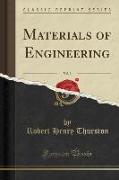- Start
- Materials of Engineering, Vol. 3 (Classic Reprint)
Materials of Engineering, Vol. 3 (Classic Reprint)
Angebote / Angebote:
Excerpt from Materials of Engineering, Vol. 3
1. The knowledge of metals possessed by the early races of mankind was of the most inexact and unsatisfactory character. They were probably led to seek a method of utilizing them, first, by the demands of their fighting classes. Their structures, there implements of agriculture and war, and their domestic utensils were, in the earliest stages of their race-history, of wood, bone and stone. All races are found to have advanced to their present condition of civilization from a primitive state of barbarism, in which they were entirely ignorant of the use of metals, and knew nothing of even the simplest processes of reduction.
The weapons of mankind, in prehistoric times, were at first made of hard wood, of bone, or of stone, fashioned with long and patient labor into rude and inefficient forms. As the race advanced in knowledge and intelligence, they acquired, by some fortunate circumstance, a knowledge of the methods of reducing from the ores the more easily deoxidized metals, and, still later, those which cling with tenacity to oxygen, and require considerable knowledge and skill, and special apparatus for their reduction to the metallic state, and at a still very easy period, they applied the more common and more generally useful metals in their rude manufacturers.
About the Publisher
Forgotten Books publishes hundreds of thousands of rare and classic books. Find more at www.forgottenbooks.com
This book is a reproduction of an important historical work. Forgotten Books uses state-of-the-art technology to digitally reconstruct the work, preserving the original format whilst repairing imperfections present in the aged copy. In rare cases, an imperfection in the original, such as a blemish or missing page, may be replicated in our edition. We do, however, repair the vast majority of imperfections successfully, any imperfections that remain are intentionally left to preserve the state of such historical works.
Folgt in ca. 5 Arbeitstagen

